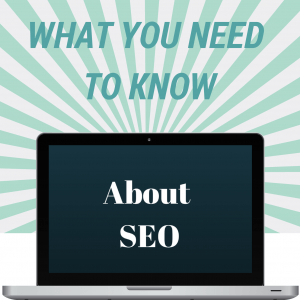For those of us who spend hours each week reading about different facets of online marketing, there are many SEO facts and best practices that seem obvious to us that still aren’t understood by your average business owner. Dedicated, experienced SEO professionals have way more knowledge about the nitty gritty particulars of what makes for effective SEO than is covered here (and most know loads more than I do personally), but you don’t really need to know all that stuff anyways.
If SEO isn’t your personal specialty, but is something that matters to you and your business, these are the key things you absolutely need to know to avoid making decisions that could hurt your company.
1) SEO factors can be divided into two categories:
On-Page SEO Factors
This is the stuff you can control. You can optimize your website for SEO by making sure the site design is intuitive, the pages load quickly, and you strategically place keywords in the main parts of the page that are noticed by search engine crawlers:
- Title tags
- Headings
- Image alt tags
- On-page copy
- Meta descriptions (doesn’t influence rankings, but good for encouraging clicks)
- Page URLs
You can find a few more details on this part of the process in the SEO Basics presentation here.
Off-Page SEO Factors
This is the trickier part and where some businesses get in trouble. Search engines try to gauge how trustworthy a site is based on off-page factors like how many other sites link to it, how authoritative those sites are, the authority of authors who write on your site and share your site, and some various other complicated factors that help the search engines decide if people really like you.
2) SEO takes time.
You’re not gonna see results tomorrow. Or next week. Or the next. It takes time for Google to pick up on changes, and even more time for SEO efforts to start to add up into something tangible. There may be some slight changes to your rankings in a short period of time (especially if you start off ranking very low and are pursuing SEO on your site for the first time), but good SEO is a long game and results take time.
3) SEO is a long-term process.
Related to #2, but still its own point, you can’t make a few tweaks to your site once and figure you’ve got SEO taken care of. It’s not a one and done deal. SEO is a continuous process that requires:
- Fresh content
- Regular tweaks to your site
- Ongoing efforts to raise brand awareness and encourage legitimate links, and
- A continual tracking of analytics to determine what’s working.
If you get yourself up to a nice high rank and figure you’re good and can stop, your competitors will take advantage of that false sense of security to unseat you.
4) Bad SEO can hurt you.
Google and their ilk hate spammers. The people out to game the system to get low-quality sites ranking higher than they should are precisely the enemies search engines are trying to take out with every new update to the algorithm. If you hire those people – even if you do so innocently, thinking they’re legitimate professionals who know what they’re doing – you risk hurting your business.
You cannot make rash decisions when it comes to your site’s SEO, you have to seek out white-hat SEO professionals who really know what they’re doing and won’t put you at risk.
5) SEO evolves.
As the search engines update their algorithms to foil the spammy SEO perpetrators addressed above, what works best for SEO changes. This is another reason it must be treated as a long-term process. What works best today might not be what works best in 6 months, so you have to stay on top of the changes and be prepared to adapt.
6) Search engines prefer sites that prioritize people over search engines.
It might sound counter-intuitive, but it’s true. If your site seems more designed to please the search engine deities rather than your actual visitors, it’ll be bad for your business (who’s gonna stay on a site that’s not useful, much less buy something off it) and bad for your rankings. Search engines consider things like how long visitors stay on a site and whether they ever bother to come back, so they can get a sense of whether or not the people stopping by actually like the site.
7) Keywords matter.
You have to be careful not to overdo it on the keywords – a keyword focus can’t outweigh the importance of making sense and writing content that’s easy to read – but keywords do matter in SEO. Keyword research helps you understand what people in your industry and, more importantly interested in your industry, are talking about. That lets you know what kind of things to write about on your site, what kind of questions to answer, and what terms to use. You should pick different target keywords for each page on the site and include them in all of the parts of the page listed in the On-Page SEO Factors section in #1.
You want to choose keywords to emphasize based both on how popular they are and how competitive they are. If a small business decides it wants to dominate for a broad, popular keyword like “bathing suits,” it’s never gonna beat the likes of Target, Victoria’s Secret and the other huge brands sitting at the top of the search results for the term. But something more specific, like “vintage style plus size bathing suits” (what those in the biz call a “long-tail keyword”) will be a more reasonable goal.
8) Content matters.
Content only ever seems to become more important to SEO as time passes and search engines evolve. Content provides value to site visitors, gives them a reason to stay on the site longer, answers their questions, and can help in the process of turning visitors into customers. Content is valuable to businesses beyond its role in SEO, but its importance to SEO can’t be discounted. Fresh content is one of the factors search engines take into consideration in site rankings. More importantly though, good content fuels the shares (read: links) and return visits to the site that signal authority and trust to the search engines.
9) Analytics matter.
Pay attention to what people do on your site. If you have pages that have high bounce rates (people that only stay on them for a second before leaving), they’re not doing you any good in terms of future sales or SEO. Weed out what’s not working and identify what is. Your SEO strategy should be regularly refined based on what your analytics tell you.
10) Traffic should not be your primary goal.
As previously mentioned, if you’re getting people to your site who don’t stay there, that tells search engines something about the value of your site and can hurt your rankings. Any increase in traffic is at best a temporary win if you aren’t giving people something they value once they get there.
Empty traffic doesn’t just end up hurting you from an SEO perspective though, if you get a billion visitors who never buy anything how much are they really worth? If the point of your website is to make money, you need visitors who will turn into customers. That needs to be your primary goal.
11) You are not Google’s* priority (not as a marketer or business owner anyways).
There’s no use complaining about it. If you get a penalty and/or fall from page 1 to page 142, you can feel like Google’s done you wrong and they owe it to you to fix it, but what reason do they have to care?
Their priority is to provide useful results to the people performing searches. If it looks like your site’s guilty of the manipulative tactics that result in lower-value search results, your business gets lumped in with the bad guys.
They’re a business with their own priorities and fixing your problems (even problems caused by your rank in the almighty Google search results) don’t rank high on the list.
*Insert any other search engine name in place of Google in this section and the idea’s the same. But let’s be honest, we’re mostly talking about Google.
12) Never trust an SEO company that guarantees a #1 spot.
Remember when I mentioned back at the beginning that there are certain SEO truths that are super obvious to those of us in marketing? This ranks high on the list. The idea that there are still many businesses that buy into this line is baffling to those with some knowledge or background in SEO.
But it still happens, so it needs to be said. If an agency or individual ever pitches you based on this promise, RUN. They are not legitimate professionals who understand SEO and they’re likely to do your business more harm than good.
Now if you ever talk to an SEO firm that’s annoyed when you tell them you want to rank #1 by next month, you’ll understand why. There just aren’t shortcuts. As in most things worth doing, SEO takes some real time and commitment to do it well.




I enjoyed reading your article. I agree with everything you mentioned. I think people should write articles on their site for the user instead of trying to manipulate google for higher rankings.:)